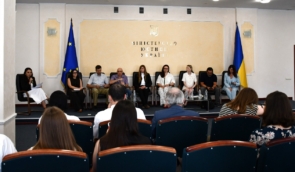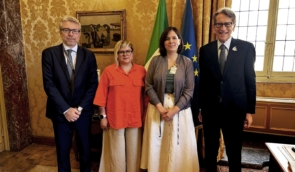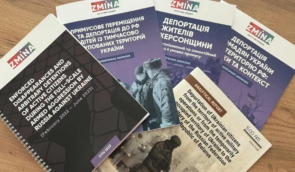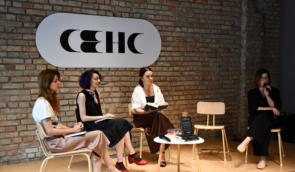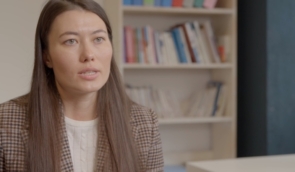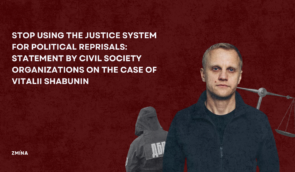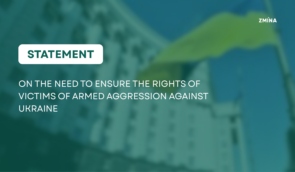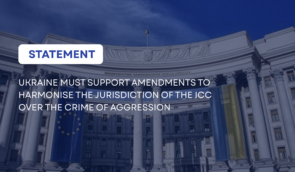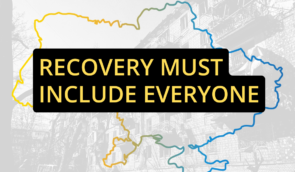An interview about Russian show trials, 120,000 criminal proceedings, and emotional trauma
Kyiv-based ZMINA is one of the biggest NGOs in Ukraine. And they have been documenting Russian human rights abuses ever since the beginning of the start of the war against their country in March 2014. ZMINA mainly focuses on some of the most egregious crimes humankind has to offer: forced disappearances, torture, ill-treatment, extra-judicial killings and sexual violence. In an interview with Tetiana Pechonchyk, the Head of the Board of ZMINA, we spoke about the flood of criminal proceedings in Ukrainian courts, Russian show trials, the case of Iryna Danylovych, and the emotional impact of ZMINA’s work on the own investigators.
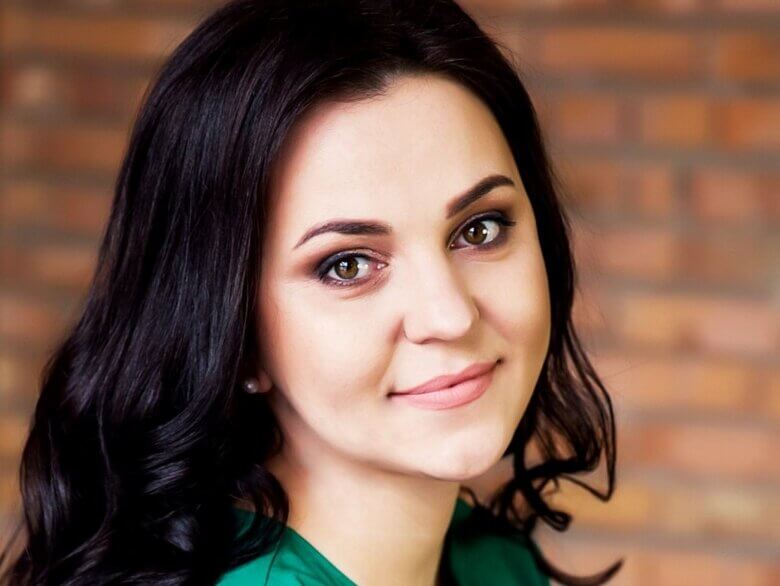
Q: Can you give us some idea of the scale of your work and how you work with Ukrainian prosecutors?
A: ZMINA provides information to local prosecutors, which is important given the huge scope of crimes. (…) Starting from 2016, we established a cooperation with the national authorities and provide materials for domestic criminal proceedings. At the moment we have over 120,000 criminal proceedings on alleged war crimes committed in Ukraine after 24th February 2022. It is a huge number and is constantly growing every day as new crimes are being committed. Having such a large number of crimes would paralyse the legal system of any country – even the most developed, with an army of prosecutors and investigators. Every new wave of aggression is on a bigger scale. For example, when looking at abductions and forced disappearances in Crimea – in the first four years of occupation, there were 44 cases of forced disappearances. Now, we have thousands of cases, and we can see that the numbers are multiplying with every wave.
Q: On the Russian side, there have been reports of show trials. Can you expand on this phenomenon
A: These politically motivated trials happened in the territories that were occupied before 24th February 2022 in Crimea and the Donbas. They then began to happen in the newly occupied territories, and inside the Russian Federation. In the newly occupied territories, the [Russian] judicial system is only just starting to be established so we are unable to visit these trials. The level of violence is very high in these areas and there is a huge risk to [observers] that they may be abducted, or even tortured and killed, so we can no longer monitor in person. In the territories that were occupied for the last ten years – particularly Crimea – the Russian Federation claimed the land as their own. There was not such a huge risk of violence as they use their own legal framework. This year we worked with a network of domestic court monitors inside the territory. ZMINA prepared a report based on 300 visits to the politically motivated court trials. We documented the cases, then analysed and published our report. It showed that this is system that is very far from justice.
Q: Please tell us about a specific human rights case you worked on.
A: There are cases such as Iryna Danylovych: a citizen, journalist, human rights defender and nurse from Crimea. On April 29, 2022, FSB officers kidnapped Danylovych and held her incommunicado for 13 days. During the confinement, Danylovych experienced psychological pressure, received physical injuries, was tricked into signing blank papers, and was held in a cold cell. She has been sentenced to 6 years and 11 months in prison on trumped-up charges of ‘possession of explosives’. As a result of sub-zero temperatures in a cell and inappropriate conditions of detention, she lost her hearing in her left ear, experiences constant headaches, and suspects to have suffered a micro-stroke in prison. She was illegally transferred from Crimea to the territory of Russia, [specifically the] Zelenokumsk prison where she still has not received any medical assistance.
Q: How are you able to stay detached from your work given the emotional toll it must incur?
A: It is not possible to stay detached form what is happening. We are in the country which is in a war. ZMINA works with deeply traumatised victims and witnesses, so there are always difficult situations for our documenters. We cannot stay fully away; one can always have empathy with whom you are talking to. Unfortunately, however, we have to get used to it because this is not new. The Russians did it in Crimea, they did it in the Donbas, so it is the third wave of Russian aggression which has not lasted for merely two years but for the last ten. We have psychological help for our employees, including periodic retreats. We try to do it at least once or twice a year and go somewhere to work with psychiatrists for several days. I think we will work with this for the rest of our lives. Given the complexity and scope of crimes, the next generations will likely still be fulfilling our mission. We have to be able to continue our documentation and collection of evidence to allow them to be used in future criminal proceedings. We have to be prepared to work for justice for a very long time.
Q: What kind of international help do you currently need?
A: The four types of international crimes are: war crimes, crimes against humanity, the crime of genocide, and the crime of aggression. The first three types of crimes fall under the jurisdiction of the ICC. However, the crime of aggression is [currently not prosecutable in the case of the invasion of Ukraine]. This means that we can work only with the results of this crime and not the source, because the source is the unprovoked aggression by Russia. If there was no Russian crime of aggression, there would be no [subsequent] crimes. We have to combine our efforts and work on the creation of a tribunal [for the crime of aggression]. ZMINA organised a publication which had dozens of signatures within the first few weeks of the large-scale invasion, calling to establish a Tribunal for the Crime of Aggression. This idea is now widely discussed, but we are still far from having any concrete shapes of this tribunal. These are not just ordinary war crimes, but also crimes against humanity. We do not have crimes against humanity in our domestic criminal court. Given the complexities of it, it is very important that the ICC investigates the abduction of civilians and the detention of thousands of Ukrainians in Russian prisons.
Source: Release Peace
If you have found a spelling error, please, notify us by selecting that text and pressing Ctrl+Enter.

